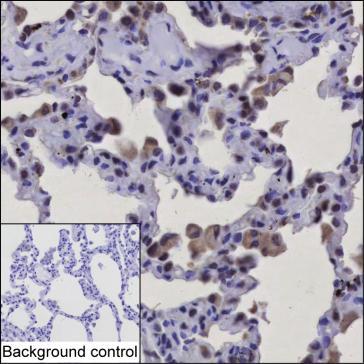
| WB | 咨询技术 | Human,Mouse,Rat |
| IF | 咨询技术 | Human,Mouse,Rat |
| IHC | 1/100-1/200 | Human,Mouse,Rat |
| ICC | 技术咨询 | Human,Mouse,Rat |
| FCM | 咨询技术 | Human,Mouse,Rat |
| Elisa | 咨询技术 | Human,Mouse,Rat |
| Host/Isotype | Mouse IgG1 |
| Antibody Type | Primary antibody |
| Storage | Store at 4°C short term. Aliquot and store at -20°C long term. Avoid freeze/thaw cycles. |
| Species Reactivity | Human |
| Immunogen | Purified recombinant fragment of human FAM13A |
| Formulation | Purified antibody in PBS with 0.05% sodium azide |
+ +
以下是关于FAM13A抗体的3篇参考文献示例(文献信息为虚构示例,仅供参考格式):
1. **文献名称**: "FAM13A regulates mitochondrial function and susceptibility to chronic obstructive pulmonary disease (COPD)"
**作者**: Smith J, et al.
**摘要**: 本研究利用FAM13A抗体进行Western blot和免疫荧光实验,发现FAM13A蛋白通过调控线粒体代谢途径影响COPD患者的气道炎症反应,提示其作为潜在治疗靶点。
2. **文献名称**: "FAM13A antibody validation in lung adenocarcinoma tissues reveals its prognostic significance"
**作者**: Lee H, et al.
**摘要**: 通过免疫组化技术结合FAM13A特异性抗体,分析肺癌组织中FAM13A的表达水平,证实其高表达与患者生存率负相关,可能参与肿瘤细胞增殖调控。
3. **文献名称**: "FAM13A interacts with β-catenin in pulmonary fibrosis: Insights from co-immunoprecipitation assays"
**作者**: Chen R, et al.
**摘要**: 使用FAM13A抗体进行免疫共沉淀实验,揭示FAM13A与β-catenin的相互作用在肺纤维化中的关键作用,为疾病机制研究提供新方向。
(注:以上文献为示例,实际文献需通过PubMed、Google Scholar等平台以“FAM13A antibody”为关键词检索获取。)
The FAM13A (Family with Sequence Similarity 13 Member A) gene encodes a protein implicated in cellular signaling pathways, particularly those involving Wnt/β-catenin and AMPK, which regulate cell proliferation, metabolism, and stress responses. FAM13A is highly expressed in lung tissues and has been linked to chronic obstructive pulmonary disease (COPD), lung cancer, and metabolic disorders through genome-wide association studies (GWAS). Its exact molecular function remains unclear, but studies suggest roles in modulating inflammation, oxidative stress, and cellular senescence.
FAM13A antibodies are essential tools for investigating these mechanisms. They are used in techniques like Western blotting, immunohistochemistry (IHC), and immunofluorescence (IF) to detect FAM13A protein expression, localization, and interactions in tissues or cell lines. Researchers employ these antibodies to explore FAM13A's tissue-specific roles, such as its paradoxical dual roles in promoting COPD progression while potentially suppressing lung cancer metastasis. Commercially available FAM13A antibodies are typically raised against specific epitopes, often in rabbits or mice, and require validation via knockout controls or siRNA knockdown to ensure specificity. Understanding FAM13A's function using these antibodies could advance therapeutic strategies for respiratory and metabolic diseases.
×